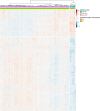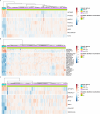Breast tumors from ATM pathogenic variant carriers display a specific genome-wide DNA methylation profile
- PMID: 40069712
- PMCID: PMC11899765
- DOI: 10.1186/s13058-025-01988-w
Breast tumors from ATM pathogenic variant carriers display a specific genome-wide DNA methylation profile
Abstract
Background: The ataxia-telangiectasia mutated (ATM) kinase phosphorylates and activates several downstream targets that are essential for DNA damage repair, cell cycle inhibition and apoptosis. Germline biallelic inactivation of the ATM gene causes ataxia-telangiectasia (A-T), and heterozygous pathogenic variant (PV) carriers are at increased risk of cancer, notably breast cancer. This study aimed to investigate whether DNA methylation profiling can be useful as a biomarker to identify tumors arising in ATM PV carriers, which may help for the management and optimal tailoring of therapies of these patients.
Methods: Breast tumor enriched DNA was prepared from 2 A-T patients, 27 patients carrying an ATM PV, 6 patients carrying a variant of uncertain clinical significance and 484 noncarriers enrolled in epidemiological studies conducted in France and Australia to investigate genetic and nongenetic factors involved in breast cancer susceptibility. Genome-wide DNA methylation analysis was performed using the Illumina Infinium HumanMethylation EPIC and 450K BeadChips. Correlation between promoter methylation and gene expression was assessed for 10 tumors for which transcriptomic data were available.
Results: We found that the ATM promoter was hypermethylated in 62% of tumors of heterozygous PV carriers compared to the mean methylation level of ATM promoter in tumors of noncarriers. Gene set enrichment analyses identified 47 biological pathways enriched in hypermethylated genes involved in neoplastic, neurodegenerative and metabolic-related pathways in tumor of PV carriers. Among the 327 differentially methylated promoters, promoters of ARHGAP40, SCGB3A1 (HIN-1), and CYBRD1 (DCYTB) were hypermethylated and associated with a lower gene expression in these tumors. Moreover, using three different deep learning algorithms (logistic regression, random forest and XGBoost), we identified a set of 27 additional biomarkers predictive of ATM status, which could be used in the future to provide evidence for or against pathogenicity in ATM variant classification strategies.
Conclusions: We showed that breast tumors that arise in women who carry an ATM PV display a specific genome-wide DNA methylation profile. Specifically, the methylation pattern of 27 key gene promoters was predictive of ATM PV status of the women. These genes may also represent new medical prevention and therapeutic targets for these women.
Keywords: ATM gene; Biomarker; Breast cancer; DNA methylation; Epigenetics; Molecular testing.
© 2025. The Author(s).
Conflict of interest statement
Declarations. Ethics approval and consent to participate: CoFAT2 and GENESIS: Written informed consent for genetic studies and use of medical records for the present analyses was obtained from all participants. The appropriate local ethics committee (Comité de Protection des Personnes [CCP] Ile-de-France III 2002/2006) and the French data protection authority (Commission Nationale de l’Informatique et des Libertés [CNIL]) approved the study protocols CoF-AT2 and GENESIS, the individual resource collections, and the specific study on tumor material. MCCS: Written informed consent was obtained from all participants to collect a blood sample and tumor pathology materials. The study protocols were approved by Human Research Ethics Committee at the Cancer Council Victoria (MCCS). ABCFS: The study was approved by the Human Research Ethics Committee of the University of Melbourne (12496). Informed consent was obtained from all participants involved in the study. Competing interests: The authors declare no competing interests.
Figures




References
-
- Amirifar P, Ranjouri MR, Yazdani R, Abolhassani H, Aghamohammadi A. Ataxia-telangiectasia: A review of clinical features and molecular pathology. Pediatr Allergy Immunol. 2019;30:277–88. - PubMed
-
- Swift M, Morrell D, Massey RB, Chase CL. Incidence of cancer in 161 families affected by ataxia–telangiectasia. N Engl J Med. 1991;325:1831–6. - PubMed
-
- Peterson RD, Funkhouser JD, Tuck-Muller CM, Gatti RA. Cancer susceptibility in ataxia-telangiectasia. Leukemia. 1992;6(Suppl 1):8–13. - PubMed
-
- Olsen JH, Hahnemann JM, Borresen-Dale A-L, Brondum-Nielsen K, Hammarstrom L, Kleinerman R, et al. Cancer in patients with Ataxia-Telangiectasia and in their relatives in the nordic countries. JNCI J Natl Cancer Inst. 2001;93:121–7. - PubMed
MeSH terms
Substances
LinkOut - more resources
Full Text Sources
Medical
Research Materials
Miscellaneous

